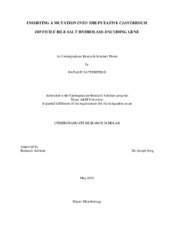| dc.creator | Satterfield, Natalie E | |
| dc.date.accessioned | 2016-09-05T14:33:07Z | |
| dc.date.available | 2016-09-05T14:33:07Z | |
| dc.date.created | 2017-05 | |
| dc.date.issued | 2015-05-25 | |
| dc.date.submitted | May 2017 | |
| dc.identifier.uri | https://hdl.handle.net/1969.1/157640 | |
| dc.description.abstract | Clostridium difficile is a Gram-positive, anaerobic, spore-forming bacterium that causes infections in the gastrointestinal tract. The mechanisms by which C. difficile is able to germinate in such a toxic environment are not fully understood. However, our lab and others have shown that certain bile components have the capacity to induce C. difficile spore germination and affect growth of C. difficile cells. Interestingly, C. difficile encodes a bile salt hydrolase (cholylglycine hydrolase), but it is unknown how this affects the bacterium’s ability to grow in the presence of bile acids. This research project is centered around the goal of inserting a mutation into the C. difficile bile salt hydrolase. This will be completed using the TargeTron Gene Knockout System, which inserts group II introns into a specific DNA location, and allelic-coupled exchange. Successful completion of this project would allow further investigation into the relationship between C. difficile’s bile salt hydrolase activity and its ability to grow in the presence of bile acids. Ultimately, fully understanding the bacterium’s method of growth could help with the development of more effective treatments for C. difficile infections in the future. | en |
| dc.format.mimetype | application/pdf | |
| dc.subject | Clostridium difficile, bile salt hydrolase | en |
| dc.title | Inserting a Mutation into the Putative Clostridium difficile Bile Salt Hydrolase-Encoding Gene | en |
| dc.type | Thesis | en |
| thesis.degree.discipline | Microbiology | en |
| thesis.degree.grantor | Undergraduate Research Scholars Program | en |
| dc.contributor.committeeMember | Sorg, Joseph A | |
| dc.type.material | text | en |
| dc.date.updated | 2016-09-05T14:33:07Z | |


